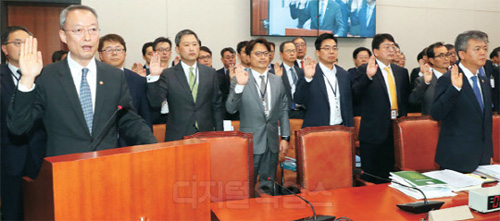"Electricity charges surged by more than 20% at the time of depletion ..." Policy Workshop
[ Park Byung Rib riby@ ] | 2017-10-13 11:05:19
The first public inspection of the government started after the inauguration of Moon Jae-in. On the same day, Minister of Industry and Commerce Minister Baek Woon-kyu (left-hand side), subordinate chief engineers and government officials hold an oath at the National Assembly of Industrial and Commercial Resources Small Venture Business Committee held in Yeouido National Assembly of Seoul.
On October 12, National Assembly Industrial and Commercial Resources Small and Medium-sized Venture Company Committee started a workshop.
Opposition parties blamed the government for reducing electricity prices, saying, "Electricity prices are inevitable, " and that the cost of generating electricity and electricity is reduced by about 20 percent since the cost of nuclear power generation and reprocessing costs is reduced by 24 percent compared to the new generation of renewable energy and other sources. Regarding this, the Minister of Commerce, Industry and Energy said, " There is no increase in electricity prices by 2022. " and by 2030, the demand for electricity could decrease significantly, thus lowering the price of electricity.
Currently, the government is pushing ahead with measures to boost the country`s renewable energy generation by 20 percent by 2030, including solar and wind power. Currently, the percentage of nuclear reactors, which are currently 30 percent, is planned to drop to 18 percent.
Rep. Kim Jeong-hoon of the Korea Freedom Alliance said, "Based on a report commissioned by the National Assembly, the number of power production costs increased 46.1 percent from 2015 to 2035."
If the cost is reflected, it can be said that the electricity rate can rise immediately next year. Kim predicted the electricity rate would rise 2.13% in 2016, from 113.2 won / kWh in 2018 to 111.23 won / kWh in 2016. It is estimated that it will increase by 7.21% to 119.25 won / kWh in 2019 and increase by 10.45% to 122.86 won / kWh in 2020. In particular, from 2024, it was 134.62 won / kWh, and the electricity rate could rise to 20%.
Regarding the new hike, the Minister of Commerce, Industry and Energy quoted, "The new generation of renewable energy equipment drastically reduces the impact on new renewable energy prices. The Ministry of Commerce, Industry and Energy said, "According to the plan, the demand for electricity will be reduced by 100.5 GW in 2030, which is expected to reduce the cost of electricity by eliminating the need to replace power plants with liquefied natural gas (LNG)."
The free Korean House of Representatives member Kwak Dae - hoon also presented the forecasts that the electricity rate will rise by 18.0% until 2030 based on the estimates of KPX submitted by the Ministry of Industry. Kwak argues that even if the cost of social welfare is 500 billion won and the post-processing cost is 1,188 billion won, the cost of generating electricity is only 54 won per 1 kW, but the cost of renewable energy is 221 Won and the cost of nuclear power is only 24.4% did. On July 19, Baek Woon-kyu, the Minister of Commerce, Industry and Commerce, said, "The low cost of nuclear power plants does not adequately reflect the environmental costs, and results in incompleteness of costs and other costs. Kwak said, "The government is distorting the cost of nuclear power generation, including social costs and post-processing costs, and emphasizes the necessity of decontamination."
By Park Byung Rib riby@



